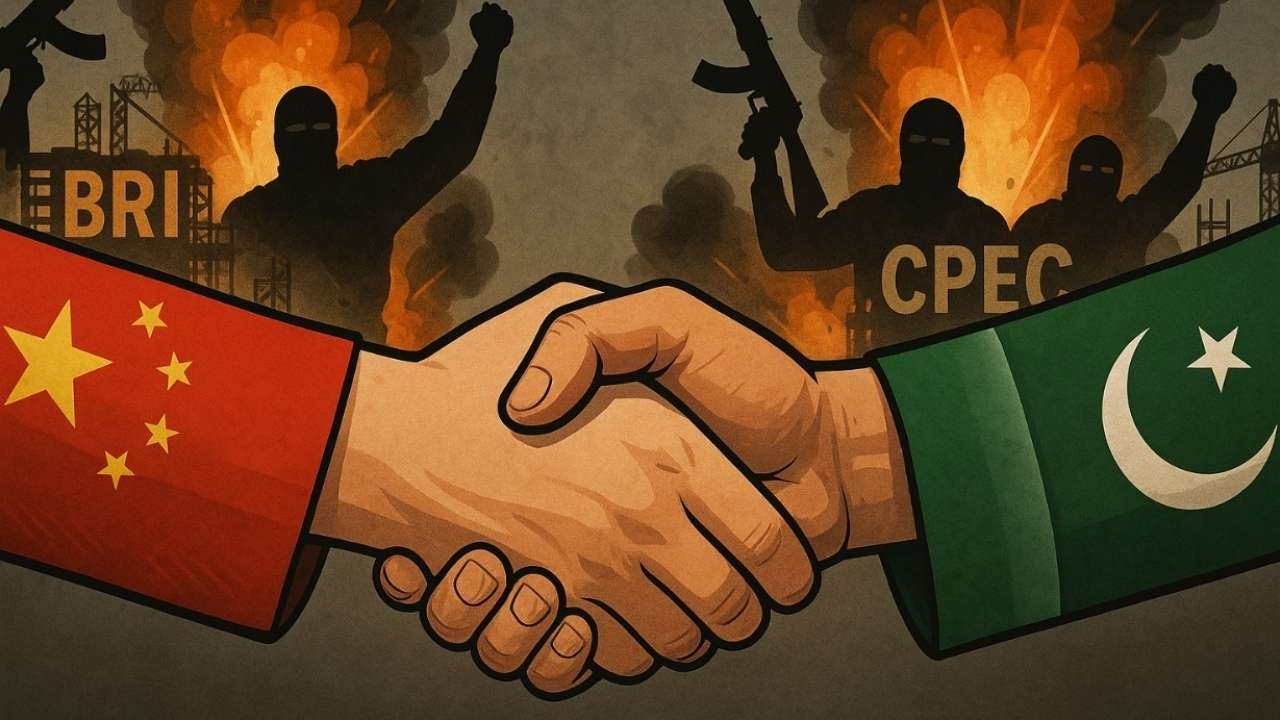Red Dragon at a Crossroads with Terrorism’s Venom: China vs Pakistan
China’s blind economic expansion and Pakistan’s patronage of terror collide, threatening to implode their so-called strategic partnership.
Total Views |

On July 25, Pakistan’s Chief of Army Staff (COAS), General Asim Munir shared a word with the Vice Chairman of China’s Central Military Commission, Zhang Youxia. Youxia urged Pakistan to ensure the safety of Chinese nationals, projects, and institutions operating in the country. Notably, China has been repeatedly calling for stronger security, reflecting lingering apprehensions that continue to cast a shadow over the “all-weather strategic cooperative partnership.” The multiplied attacks on Chinese nationals and infrastructure within Pakistan, particularly those associated with the China-Pakistan Economic Corridor (CPEC), have exacerbated. This has put Pakistan in a delicate position as China has grown increasingly vocal about its expectations for more robust security measures. Despite Pakistan’s efforts to boost security, a persistent wave of violence raises questions about Islamabad’s ability to protect Chinese interests, which could badly damage relations between the two countries. If Pakistan fails to protect Chinese nationals, relations could deteriorate to the point that Islamabad risks losing its only major ally.
Cross Roads: Growing Threat to CPEC
The cornerstone of the relationship between China and Pakistan is the China-Pakistan Economic Corridor (CPEC), aflagship initiative of China’s Belt and Road Initiative (BRI), valued at around USD $60 billion with roughly $25 billion invested to date. Since its beginning in 2013, CPEC has been instrumental in funding various infrastructure projects, including highways, power plants, and the development of the strategic Gwadar Port, which promises significant economic dividends for Pakistan.
Despite the promises of economic growth, CPEC has also exposed Pakistan to new security challenges. Chinese nationals have been the frequent target of attacks by various terrorist and insurgent groups. High-profile incidents, such as the March 26 attack on Chinese engineers in Shangla, the 2021 Dasu bus attack that killed nine Chinese engineers, and the 2022 attack on Karachi University’s Confucius Institute, have underscored the vulnerability of Chinese citizens working in Pakistan. These incidents have not only disrupted projects but have also compelled China to reconsider its level of involvement and safety in Pakistan.
Chinese nationals and their interests in Pakistan are targeted primarily by Baloch separatist groups, with the Pakistani Taliban as a secondary threat. Groups like the Baloch Liberation Army (BLA) oppose CPEC projects, arguing that the Chinese exploit local resources without benefiting the region’s indigenous population. The BLA twice warned China to leave Balochistan or face increased attacks. Meanwhile, the terrorist group Tehreek-e-Taliban Pakistan (TTP) has also targeted Chinese interests. However, its motivation is likely derived from its ideological opposition to the Pakistani state. TTP considers Pakistan to be an “infidel state” and aims to wage a war against it and its allies. Pakistan has struggled to eliminate the diverse threats from these terrorist groups with differing agendas, thereby exasperating its closest ally.
Red Dragon’s increasing frustration with Pakistan’s terrorism

China’s frustration with Pakistan has grown more visible and harsh in recent years, marked by a shift from behind-the-scenes diplomatic pressure to public demands for enhanced security measures. Following repeated attacks on Chinese nationals, China has increased its calls for more rigorous protection, even hinting at employing private security firms if Pakistan cannot guarantee safety. Pakistan has pledged to improve the protection of Chinese nationals, but its capacity to meet these expectations has been again and again slashed down by its state-sponsored unchecked terrorism. Earlier in 2024, after an attack on Chinese nationals in Shangla, China halted two projects temporarily and raised concerns over Pakistan’s counterterrorism measures. This pause signified a rare show of China’s dissatisfaction and indicated how security concerns could impact broader economic cooperation. The crisis reached a boiling point recently when the Chinese Ambassador to Pakistan made furious comments publicly in a seminar about Pakistan’s inability to stop the terrorists from attacking Chinese nationals. These comments came in the aftermath of a terrorist attack in Karachi targeting the Chinese engineers in Karachi, just days before the Shanghai Cooperation Organisation summit in Islamabad. Pakistan’s foreign office pushed back in response.
Conclusion
Pakistan’s security challenges and repeated attacks on Chinese nationals by Islamic terrorists pose a serious threat to the China–Pakistan partnership. Which has been a mainstay of Pakistan’s foreign policy. This could even limit Pakistan’s capacity to fund terrorism against India. As there will be no funding from China for any development project under CPEC.
And if Islamabad fails to assure Beijing of its commitment and ability to protect Chinese interests, it risks a diplomatic rift that could curtail the flow of Chinese investment and lead to a strategic realignment against Pakistan’s national security interests. In case of Beijing’s falling out with Pakistan, Islamabad will be isolated regionally as well as internationally, as it does not have good working relations with any of its neighbouring nations orany other European nation. Ultimately, Pakistan’s failure to act represents a risk to its strategic relevance and its future sustainability, which somehow or another is dependent on China’s economic assistance.
Article by

Kewali Kabir Jain
Journalism Student at Makhanlal Chaturvedi National University of Journalism and Communication

